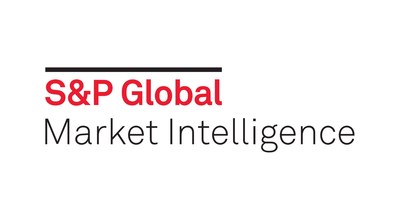NEW YORK, April 29, 2021 /PRNewswire/ -- Community banks and their larger counterparts stand to report far fewer loan losses than previously expected, according to S&P Global Market Intelligence's annual U.S. Bank and U.S. Community Bank Market Reports. The two new reports conclude that the outlook for bank returns is far more favorable now than even a few months ago as credit costs should be significantly lower than previously expected due to the accelerated pace of vaccinations and additional government stimulus.
Published by S&P Global Market Intelligence's Financial Institutions Group (FIG) Research team, the reports spotlight how the banking industry and community banks have responded to the pandemic. The analyses found that the efforts made by banks and the U.S. government to mitigate COVID-19's economic blow has prevented credit deterioration and pushed excess cash into the banking system. As a result, banks have effectively traded credit risk for pressure on net interest margins.
"The banking industry's swift response to the economic crisis created by the pandemic has offered considerable support to many Americans and stands in stark contrast to the last recession. Banks have been part of the solution, not the problem," said Nathan Stovall, principal analyst for FIG at S&P Global Market Intelligence. "Community banks in particular have outpunched their weight, springing into action to assess the potential credit risk in their loan portfolios, while furiously working to offer borrowers some relief through forbearance programs and loans through the Paycheck Protection Program."
Key highlights from the report include:
- Government stimulus, actions by the Federal Reserve and community banks' support for borrowers through forbearance and the Paycheck Protection Program have significantly mitigated credit losses but have led to pressure on net interest income — the key source of revenue for most community banks.
- Deposits jumped more than 20% year over year across the banking industry, while increasing nearly 13% at community banks. This outsized deposit growth stemmed from Fed efforts to flood the markets with liquidity, along with historically high consumer savings rates stemming from government stimulus.
- Excess cash and historically low interest rates punished banks' net interest margins. Margins will remain below historical levels for the foreseeable future as liquidity continues to build in the banking system.
- The outlook for bank returns is far more favorable now than even a few months ago as credit costs should be significantly lower than previously expected. Community bank earnings are projected to fall nearly 13% in 2021, compared to a 41% decline projected in January 2021. Earnings will rebound more than 15% in 2022 as credit quality improves.
- The Biden administration has proposed a multi-trillion-dollar infrastructure plan that it would fund by raising the corporate tax rate to 28%. If that occurred in 2022, community bank earnings would rise just 5% year over year.
|
Community bank aggregate profitability metrics (%) |
||||||
|
2020A |
2021P |
2022P |
2023P |
2024P |
2025P |
|
|
Efficiency ratio |
61.70 |
64.36 |
64.99 |
63.34 |
61.88 |
61.28 |
|
Net interest margin |
3.36 |
3.31 |
3.25 |
3.35 |
3.44 |
3.47 |
|
ROAA |
1.13 |
0.89 |
0.99 |
1.03 |
1.29 |
1.30 |
|
ROAE |
10.08 |
8.15 |
9.10 |
9.36 |
11.59 |
11.42 |
|
Adjusted for potential tax increases - assumes 28% tax rate beginning in 2022 |
||||||
|
ROAA |
1.13 |
0.89 |
0.90 |
0.93 |
1.17 |
1.18 |
|
ROAE |
10.08 |
8.15 |
8.31 |
8.58 |
10.65 |
10.55 |
|
Data compiled April 15, 2021. |
||||||
|
A = actual; P = projected |
||||||
|
ROAA = Return on average assets; ROAE = Return on average equity |
||||||
|
Sources: S&P Global Market Intelligence; proprietary estimates |
||||||
|
© 2021 S&P Global Market Intelligence. All rights reserved. |
||||||
To request a copy of the 2021 U.S. Community Bank Market Report and/or the 2021 U.S. Bank Market Report, please contact pressinquiries.mi@spglobal.com.
S&P Global Market Intelligence's FIG Research team provides independent forecasts and real-time analysis of the banking, insurance and financial technology sectors, across multiple geographies, leveraging the deep sector knowledge of its analysts. The FIG offering complements S&P Global Market Intelligence's broad universe of research sector coverage including energy, enterprise technology, leveraged loans, metals & mining and TMT (Technology, Media and Telecom).
S&P Global Market Intelligence's opinions, quotes, and credit-related and other analyses are statements of opinion as of the date they are expressed and not statements of fact or recommendation to purchase, hold, or sell any securities or to make any investment decisions, and do not address the suitability of any security.
About S&P Global Market Intelligence
At S&P Global Market Intelligence, we understand the importance of accurate, deep and insightful information. We integrate financial and industry data, research and news into tools that help track performance, generate alpha, identify investment ideas, perform valuations and assess credit risk. Investment professionals, government agencies, corporations and universities around the world use this essential intelligence to make business and financial decisions with conviction.
S&P Global Market Intelligence is a division of S&P Global (NYSE: SPGI), the world's foremost provider of credit ratings, benchmarks and analytics in the global capital and commodity markets, offering ESG solutions, deep data and insights on critical business factors. S&P Global has been providing essential intelligence that unlocks opportunity, fosters growth and accelerates progress for more than 160 years. For more information, visit www.spglobal.com/marketintelligence.
Media Contact
Amanda Oey
S&P Global Market Intelligence
+1 212-438-1904
amanda.oey@spglobal.com
SOURCE S&P Global Market Intelligence
